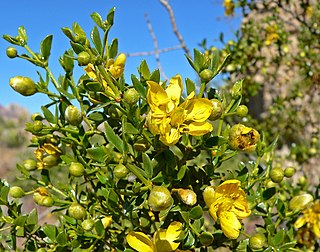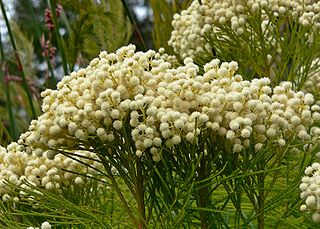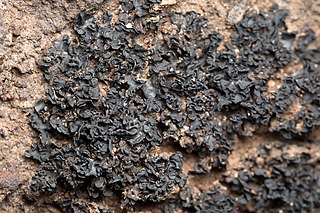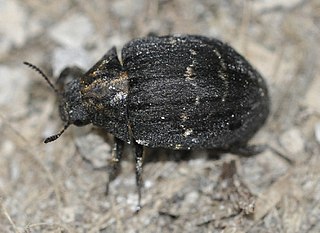
The Polygonaceae are a family of flowering plants known informally as the knotweed family or smartweed—buckwheat family in the United States. The name is based on the genus Polygonum, and was first used by Antoine Laurent de Jussieu in 1789 in his book, Genera Plantarum. The name may refer to the many swollen nodes the stems of some species have, being derived from Greek [poly meaning 'many' and gony meaning 'knee' or 'joint']. Alternatively, it may have a different origin, meaning 'many seeds'.

Roald Dahl was a British author of popular children's literature and short stories, a poet, and wartime fighter ace. His books have sold more than 300 million copies worldwide. Dahl has been called "one of the greatest storytellers for children of the 20th century".

The Thomisidae are a family of spiders, including about 170 genera and over 2,100 species. The common name crab spider is often linked to species in this family, but is also applied loosely to many other families of spiders. Many members of this family are also known as flower spiders or flower crab spiders.

Ctenizidae is a small family of mygalomorph spiders that construct burrows with a cork-like trapdoor made of soil, vegetation, and silk. They may be called trapdoor spiders, as are other, similar species, such as those of the families Liphistiidae, Barychelidae, and Cyrtaucheniidae, and some species in the Idiopidae and Nemesiidae. The name comes from the distinctive behavior of the spiders to construct trapdoors, and ambush prey from beneath them.

Apocynaceae is a family of flowering plants that includes trees, shrubs, herbs, stem succulents, and vines, commonly known as the dogbane family, because some taxa were used as dog poison. Members of the family are native to the European, Asian, African, Australian, and American tropics or subtropics, with some temperate members. The former family Asclepiadaceae is considered a subfamily of Apocynaceae and contains 348 genera. A list of Apocynaceae genera may be found here.

Zygophyllaceae is a family of flowering plants that contains the bean-caper and caltrop. The family includes around 285 species in 22 genera.

James and the Giant Peach is a 1996 musical fantasy animated film directed by Henry Selick, based on the 1961 novel of the same name by Roald Dahl. It was produced by Tim Burton and Denise Di Novi, and starred Paul Terry as James. The film is a combination of live action and stop-motion animation. Co-stars Joanna Lumley and Miriam Margolyes played James's aunts in the live-action segments, and Simon Callow, Richard Dreyfuss, Susan Sarandon, Jane Leeves, David Thewlis, and Margolyes voiced his insect friends in the animation sequences.

Dipterocarpaceae is a family of 16 genera and about 695 known species of mainly tropical lowland rainforest trees. Their distribution is pantropical, from northern South America to Africa, the Seychelles, India, Indochina, Indonesia, Malaysia and Philippines. The greatest diversity of Dipterocarpaceae occurs in Borneo.

The Trichocomaceae are a family of fungi in the order Eurotiales. Taxa are saprobes with aggressive colonization strategies, adaptable to extreme environmental conditions. Family members are cosmopolitan in distribution, ubiquitous in soil, and common associates of decaying plant and food material.
Deania is a genus of long-snouted, deepwater dogfish sharks in the family Centrophoridae.

Bruniaceae is a family of shrubs native to the cape region of South Africa. They are mostly restricted to the Cape Province, but a small number of species occur in KwaZulu-Natal.
Herpyllobiidae is a family of cyclopoid copepods in the order Cyclopoida. There are about 6 genera and more than 20 described species in Herpyllobiidae.

The Lichinaceae are a family of ascomycete fungi. Most species are lichenized with cyanobacteria, and have a distribution largely in temperate regions.

Silvanidae, "silvan flat bark beetles", is a family of beetles in the superfamily Cucujoidea, consisting of 68 described genera and about 500 described species. The family is represented on all continents except Antarctica, and is most diverse at both the generic and species levels in the Old World tropics.

The Metopininae are a subfamily of flies in the family Phoridae.

The Didymellaceae are a family of fungi in the order Pleosporales. They have a world-wide distribution.

Megadictynidae is a family of araneomorph spiders first described by Pekka T. Lehtinen in 1967. They are endemic to New Zealand.

Byrrhinae is a subfamily of pill beetles in the family Byrrhidae. There are about 25 genera and at least 160 described species in Byrrhinae.

Maria Johanna Dahl, née Grosset was a Ukrainian-born German zoologist, arachnologist, and carcinologist. Along with her husband, Friedrich Dahl, she was a co-author and editor of the zoological series Die Tierwelt Deutschlands, published between 1925 and 1968.

The Metopininae is a tribe of flies in the family Phoridae.
















